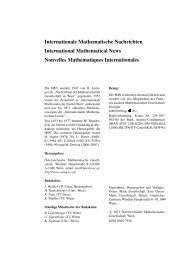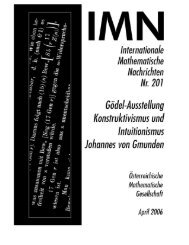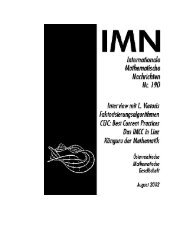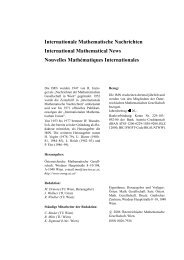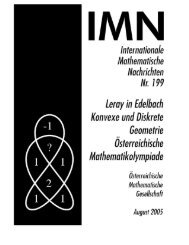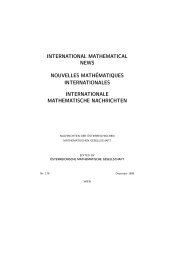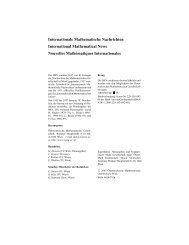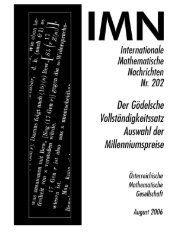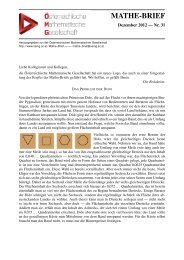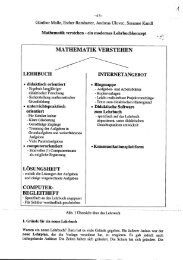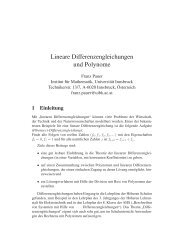internationale mathematische nachrichten - Ãsterreichische ...
internationale mathematische nachrichten - Ãsterreichische ...
internationale mathematische nachrichten - Ãsterreichische ...
Erfolgreiche ePaper selbst erstellen
Machen Sie aus Ihren PDF Publikationen ein blätterbares Flipbook mit unserer einzigartigen Google optimierten e-Paper Software.
Your disproof essentially relies on computer computations. What do you<br />
think, which role does and should the computer play in mathematics?<br />
I have written on this topic before (for example in ”<br />
Applications of symbolic<br />
mathematics to mathematics,“ pp. 95–111 in ”<br />
Applications of Computer<br />
Algebra,“ R. Pavelle, ed., Kluwer, 1985, and available on my home page<br />
at http://www.research.att.com/∼amo). The role of computers in mathematics<br />
is increasing rapidly. They can be used to help in proving theorems,<br />
as in the case of Herman te Riele’s and my work on the Mertens conjecture.<br />
However, it is worth keeping in mind that the main purpose of computing in<br />
mathematics should be insight, not numbers (to quote Richard Hamming).<br />
Symbolic algebra allows us to avoid laborious manipulations, by performing<br />
routine integrations and algebraic operations. Numerical routines offer similar<br />
assistance in solving linear algebra or optimization problems. This frees<br />
the human mind to do more creative work. Further, computers allow us to<br />
explore mathematical structures much more thoroughly than we can mentally<br />
or with paper and pencil. This allows us to develop our intuition, guess<br />
what the underlying principles are, and prove theorems about them.<br />
What is your guess for the Riemann conjecture? Do you think that this<br />
problem can be solved in the near future?<br />
It is either true or false, and I do not hazard to guess which it is. I also do<br />
not venture to guess when it might be solved. I have not yet seen any ideas<br />
that seemed likely to lead to a proof of the Riemann Hypothesis in the near<br />
future, but that does not mean that one will not be found tomorrow. On the<br />
other side, if there are any counterexamples, my guess is they are located<br />
far above the regions where we are able to compute the zeta function.<br />
Of course, it is difficult to give ”<br />
prophetic answers“ but do you think<br />
that a positive solution of the Riemann conjecture would have a big impact<br />
on analytic number theory?<br />
It would have a profound effect on all of mathematics. It certainly would<br />
revolutionize analytic number theory, and could also have a huge impact on<br />
areas such as computational number theory, although how that would work<br />
out would depend very much on the nature of the proof.<br />
Prof. Odlyzko, you are working in so many different fields, analytic<br />
and computational number theory, analytic combinatorics, etc. You combine<br />
theory and practice. Do you think that there is a fruitful balance of theory<br />
and applications in modern mathematics or should there be a change?<br />
Overall, I suspect the balance between theory and applications (although<br />
those are not the ideal terms) will have to shift towards applications. The<br />
rapidly developing Information Society offers many opportunities for mathematics,<br />
and if mathematicians do not seize them, others, whether engineers<br />
or physicists, will do so.<br />
Thank you very much for this interview.<br />
8



